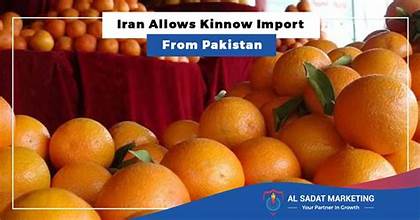Pakistan is well-known for its diverse agricultural products, with citrus fruits holding a special place among them. Among the citrus varieties, Kinnow has gained particular prominence due to its refreshing taste, juiciness, and high nutritional value. For decades, Kinnow has been cultivated in abundance across Punjab, becoming not only a local delicacy but also an export commodity with immense potential. Recognizing this, Pakistan has now set its sights on transforming Kinnow into a global brand. This initiative is coupled with enhanced support for local growers, with the government and private sector working to ensure that the fruit can compete in international markets.
This ambitious move signals a new era for the country’s agricultural economy, with potential benefits ranging from higher farmer incomes to stronger export revenues. However, it also requires comprehensive strategies, from modern farming techniques to efficient marketing campaigns, to make Kinnow a recognizable brand worldwide.
The Significance of Kinnow in Pakistan
Kinnow, a hybrid variety of mandarin, is predominantly grown in Punjab, particularly in districts like Sargodha, Toba Tek Singh, and Mianwali. Sargodha, in fact, is often referred to as the “Kinnow Capital” of Pakistan, producing nearly 80% of the country’s total output.
Kinnow is not just a fruit—it is an important pillar of Pakistan’s agricultural exports. According to official estimates, Pakistan produces around 2 million tons of Kinnow annually, with a significant portion being exported to countries in the Middle East, Russia, Central Asia, and Europe. However, despite this strong base, Pakistan’s citrus exports face hurdles such as inconsistent quality, outdated farming methods, and insufficient branding efforts.
The decision to globalize Kinnow is rooted in the idea of capitalizing on its unique taste and nutritional benefits while addressing the systemic challenges that prevent it from reaching its full potential.
Why Global Branding Matters
In today’s competitive global food market, branding is as crucial as quality. Countries like Spain and Morocco have successfully positioned their citrus fruits under strong brand identities, which allow them to fetch higher prices internationally. For Pakistan, developing a strong “Kinnow brand” can create recognition, enhance trust, and ensure steady demand across multiple markets.
A well-branded Kinnow can carry the message of quality, freshness, and Pakistani heritage. It can also help differentiate it from other citrus fruits available globally. The goal is to move away from selling Kinnow as just another commodity and instead market it as a premium product with a story—one tied to Pakistan’s rich agricultural tradition.

Government Support for Growers
To transform Kinnow into a global brand, Pakistan has begun rolling out initiatives to support local growers. The government has recognized that unless farmers have access to modern technology, quality inputs, and training, branding efforts alone will not succeed. Key areas of support include:
- Subsidies and Incentives: Farmers are being encouraged through subsidies on fertilizers, pest control solutions, and farm machinery. This helps reduce production costs and improves crop yield.
- Training Programs: Workshops and training sessions are being arranged to teach farmers about international quality standards, grading, and packaging requirements. These programs emphasize the importance of avoiding blemishes and maintaining uniform size and color for exports.
- Cold Storage and Processing Facilities: Investments are being made in cold storage and citrus processing plants to reduce post-harvest losses. With proper storage, the shelf life of Kinnow can be extended, making it more viable for distant markets like Europe and North America.
- Financial Support: Small-scale farmers often lack access to affordable financing. Government-backed loan schemes and microfinance initiatives are being introduced to ensure growers have the capital they need for investments in quality improvement.
Meeting International Standards
One of the biggest hurdles for Pakistani Kinnow in global markets is compliance with international standards. Strict requirements related to pesticide residue levels, fruit appearance, and packaging often prevent large consignments from entering high-value markets like the European Union.
To address this, the government and private sector are working on:
- Encouraging the use of organic farming practices to reduce chemical residues.
- Introducing grading systems to ensure only premium-quality fruit is exported under the global Kinnow brand.
- Partnering with international certification bodies to help Pakistani exporters meet requirements such as GlobalG.A.P. certification.
Such measures are crucial for ensuring that Kinnow can secure a place in premium markets, thereby fetching better prices and building consumer trust.

The Role of Technology and Innovation
Technology is expected to play a key role in making Kinnow a global brand. Precision farming techniques, such as drip irrigation and soil monitoring, are being promoted to maximize yield and maintain fruit quality. Mobile apps and digital platforms are also being developed to provide farmers with real-time information on weather patterns, pest attacks, and market prices.
Additionally, research institutions are focusing on developing new seed varieties that are resistant to diseases while maintaining the fruit’s signature sweetness and juiciness. Innovations in packaging, such as eco-friendly and branded cartons, are also being encouraged to appeal to environmentally conscious consumers abroad.
Challenges on the Road Ahead
While the prospects are bright, the path to globalizing Kinnow is not without obstacles. Some of the key challenges include:
- Fragmented Supply Chains: Many small farmers operate independently, making it difficult to maintain consistent quality across large consignments.
- Infrastructure Gaps: Despite improvements, Pakistan still lags in cold chain infrastructure compared to leading citrus exporters.
- Limited Awareness: International consumers are largely unfamiliar with Kinnow as a unique fruit, which requires strong marketing campaigns.
- Climate Change: Rising temperatures and irregular rainfall patterns threaten citrus yields, necessitating climate-smart farming techniques.
Overcoming these challenges will require collective efforts by the government, growers, exporters, and research institutions.
Pakistan Seeks to Globalize Kinnow, Expands Support for Local Growers
Potential Benefits of Globalizing Kinnow
If successful, the global branding of Kinnow can yield numerous benefits:
- Boosted Farmer Incomes: By fetching higher prices in international markets, farmers can significantly increase their earnings.
- Export Revenue Growth: Citrus exports can become a stronger contributor to Pakistan’s foreign exchange reserves.
- Job Creation: From farming to processing and marketing, the entire value chain of Kinnow can generate thousands of jobs.
- International Recognition: A strong Kinnow brand can improve Pakistan’s image as a reliable supplier of quality agricultural products.
- Rural Development: Increased profitability can spur development in rural areas where citrus farming is concentrated.
Looking Ahead
The vision of making Kinnow a global brand is both ambitious and achievable. With the right blend of government support, private sector investment, and farmer participation, Pakistan can elevate this citrus variety to the same global stature as Spain’s oranges or Morocco’s mandarins.
The key lies in consistency—maintaining quality across the board, meeting international standards, and investing in strong branding strategies. Alongside this, empowering local farmers through training and financial support ensures that the benefits are distributed fairly across the supply chain.
Kinnow has long been a source of pride for Pakistan, and now it has the chance to become a symbol of the country’s agricultural potential on the world stage. By globalizing this fruit, Pakistan is not only promoting its produce but also investing in the prosperity of its people.
Conclusion
The journey to make Kinnow a global brand reflects Pakistan’s broader ambition of transforming its agriculture into a globally competitive sector. With enhanced support for growers, better infrastructure, and a focus on quality, Kinnow can emerge as a success story that benefits farmers, boosts exports, and builds Pakistan’s reputation worldwide.
The sweet, juicy Kinnow—rooted in the orchards of Punjab—may soon find itself on breakfast tables across the world, proudly carrying the label of “Product of Pakistan.”



